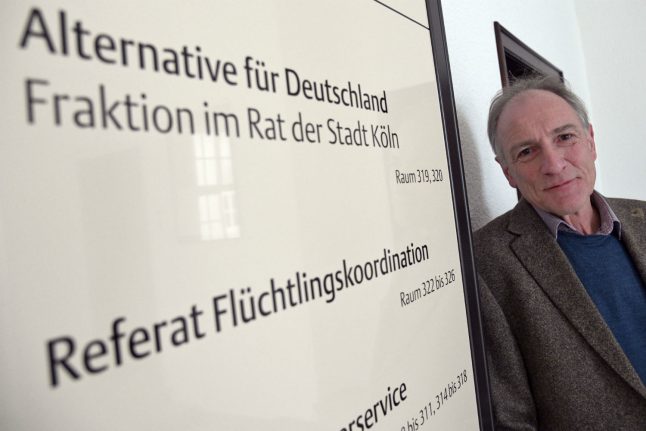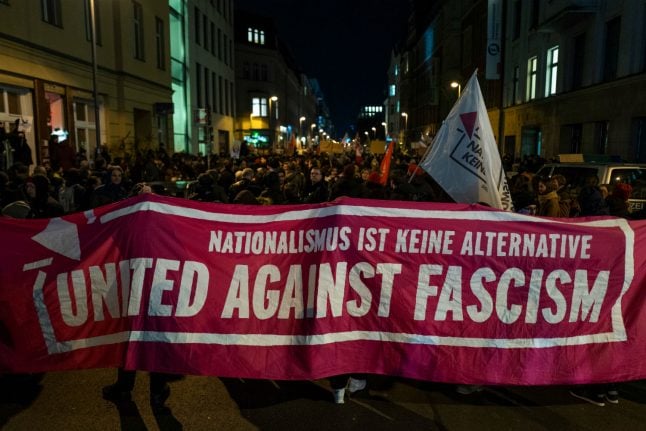Haus Neuerburg is a beautiful building, an officially listed monument built almost 100 years ago by a cigarette manufacturer and the Consul General of Greece.
Nevertheless, Hans-Jürgen Oster, head of the municipal refugee agency, had certain reservations when he moved in at the beginning of 2016 with his newly founded department.
The offices of the Cologne AfD parliamentary group are located right next to the rooms he found space in, after his offices outgrew their former location in the city's Rathaus, or town hall.
“This is a group and an office which we would normally not house next to each other,” says Oster cautiously. But then he said resolutely, “Gucken wir uns das doch mal an,” or “Well, we might as well see.”
The AfD does not have as large of a presence in the state of North Rhine-Westphalia as elsewhere in Germany, but received 7.2 percent of the vote in state elections in 2017, enough to comfortably put them into the parliament.
The right-wing group encompasses a smorgasbord of issues from standing against a ban on diesel cars to cutting back on immigration: in the past month, the AfD Cologne has tweeted about crimes around the country, emphasizing the migration background of the perpetrators.
A sitcom in the making?
Stepping into Haus Neuerburg, there are several people coming and going throughout the busy building. That’s owed on one hand to the building being the location registrar’s office and on the other to the refugee office.
Everywhere – be it in the foyer, corridors and elevator – you meet people who don’t appear as though their families had been living in the Rhineland for generations.
 Haus Neuerburg in the centre of Cologne. Photo: DPA
Haus Neuerburg in the centre of Cologne. Photo: DPA
Some of the greatest legendary Kölner themselves have refugee roots. Take, for example, prolific actor and theatre director Willy Millowitsch (1909-1999) whose family came originally from the Balkans.
The third floor: The sign says: “Alternative for Germany. Group in the Council of the City of Cologne. Room 319, 320”. And right underneath: “Refugee Coordination Unit. Room 322 to 326”.
A photo of a similar sign outside at the entrance was recently tweeted by TV author Tommi Schmitt. His comment: “I want 1 sitcom about this building.”
Ich möchte 1 Sitcom über dieses Haus. pic.twitter.com/qnETJvl3lH
— Tommi Schmitt (@TommiSchmitt) October 30, 2018
There are some elements with situation comedy potential: The AfD politicians and the refugee coordinators share a kitchenette “and the sanitary facilities”, as Oster puts it.
In retrospect, he doesn't find the set-up so bad at all: at least the two groups can learn from each other and gather information from each other. “A colleague once said: “The city of Cologne must have an educational mission.”
The ‘odd couple’ neighbours don’t seem to mind the other’s presence. Even if the AfD people would have to go past posters, which for example advertise volunteer refugee helpers, they would have never complained.
Knocking down the truth
Is that really true? After an energetic knock on one of the AfD doors faction speaker Mattias Büschges answers energetically. “Yes, please!” he says, his voice heightening in an inviting tone.
He does not understand at all what should be so special about coexistence. “That's no problem at all,” he assures. “We even work together with our colleagues. If we have questions, then we talk.”
The Cologne AfD confirmed their desire for coexistence on Twitter, quoting Büschges that they feel “quite comfortable and don't want to move away from here.”
Die @dpa bei der @AfDKoelnerRat. @MBueschges zur #Koexistenz der @AfDKoelnerRat und dem Amt für Flüchtlingskoordination im Haus #Neuerburg.
„Wir fühlen uns hier richtig wohl und wollen hier nicht weg“, beteuert Büschges. #AfD https://t.co/njnBYU0a0x— AfD-Fraktion Stadtrat Köln (@AfDKoelnerRat) November 1, 2018
Have there ever been hostilities? “Not at all! Why would there be?” says Büschges.
He also said he does not have anything against the department being renamed “Office for Integration and Diversity” in December — a sign which is to be placed directly under “Alternative for Germany”.
Additionally, the AfD can't think of a better place in Cologne.
“We feel really at home here and don't want to leave,” Büschges asserts. And as proof, he points to the window – and what it has to behold: “We even have a view of the cathedral here!”



 Please whitelist us to continue reading.
Please whitelist us to continue reading.
Member comments